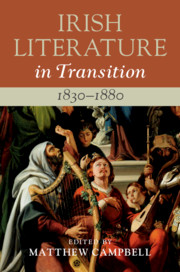Book contents
- Irish Literature in Transition, 1830–1880
- Irish Literature in Transition
- Irish Literature in Transition, 1830–1880
- Copyright page
- Contents
- Contributors
- Series Preface
- General Acknowledgements
- Acknowledgements
- Part I Contexts and Contents: Politics and Periodicals
- Chapter 1 Victorian Ireland, 1830–1880: A Transition State
- Chapter 2 Satire and Innovation between Dublin, Edinburgh and London
- Chapter 3 Young Ireland and Beyond
- Part II Ireland and the Liberal Arts and Sciences
- Part III From the Four Nations to the Globalising Irish
- Part IV The Languages of Literature
- Index
Chapter 1 - Victorian Ireland, 1830–1880: A Transition State
from Part I - Contexts and Contents: Politics and Periodicals
Published online by Cambridge University Press: 29 February 2020
- Irish Literature in Transition, 1830–1880
- Irish Literature in Transition
- Irish Literature in Transition, 1830–1880
- Copyright page
- Contents
- Contributors
- Series Preface
- General Acknowledgements
- Acknowledgements
- Part I Contexts and Contents: Politics and Periodicals
- Chapter 1 Victorian Ireland, 1830–1880: A Transition State
- Chapter 2 Satire and Innovation between Dublin, Edinburgh and London
- Chapter 3 Young Ireland and Beyond
- Part II Ireland and the Liberal Arts and Sciences
- Part III From the Four Nations to the Globalising Irish
- Part IV The Languages of Literature
- Index
Summary
It is a point of some controversy whether we can call the Ireland of the nineteenth-century ‘Victorian’, for all that Victoria was its head of state within the United Kingdom. While not a state in itself, Ireland was certainly going through what William Carleton called in 1842 a ‘transition state’. There is much that is preliminary, provisional or even experimental about the writing of nineteenth-century Ireland, caught between Romanticism and Revival and never fully accounted for in the mainstream of Victorian literary history. The writing, too, was not located solely in Ireland: famine and mass emigration meant that the Irish found themselves in the United States, Australia or India, both as participants in decolonising movements or as servants of Empire. This chapter surveys the twin location of Irish literature, nationalist and diasporic. It focuses on the work of Carleton and Jane Elgee (Speranza) while also introducing many of the themes and authors which are the subject matter of the pages that follow.
- Type
- Chapter
- Information
- Irish Literature in Transition, 1830–1880 , pp. 3 - 21Publisher: Cambridge University PressPrint publication year: 2020

